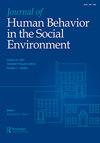揭示创新组织文化的行为联系:小学教师的认同与情感承诺
IF 1.2
Q3 SOCIAL WORK
Journal of Human Behavior in the Social Environment
Pub Date : 2023-10-11
DOI:10.1080/10911359.2023.2267600
引用次数: 1
摘要
要准确评估小学环境中创新组织文化对教师认同和情感承诺的影响,需要对现有文献进行严格的修订。目前的文献还需要进一步研究教师认同在创新文化与教师情感承诺关系中的中介作用。这强调了更全面地理解这一调解机制的必要性。因此,本研究结合行为承诺理论(BCT)和社会认同理论(SIT)两大理论框架,探讨创新组织文化及其对小学教师认同感和情感承诺的影响之间错综复杂的心理相互作用,有助于进一步理解这一现象。通过对432名教师的调查,本研究试图揭示创新驱动文化对教师组织认同和情感承诺的直接影响,以及这种认同的潜在中介作用。结构方程模型(SEM)的研究结果表明,创新氛围对教师的认同和情感承诺有显著的影响。此外,在创新文化背景下,这种认同成为进一步加强教师与所在机构的情感纽带(情感承诺)的桥梁。本研究为教育机构提供了有价值的见解,为学生、教师和学校提供了实际意义,同时也强调了未来探索的某些限制和途径。关键词:创新组织文化、组织认同、情感组织承诺、行为承诺理论、社会认同理论、小学鸣谢感谢本刊匿名审稿人为提高文章质量提供的宝贵意见。披露声明作者未报告潜在的利益冲突。作者在研究、撰写和/或发表这篇文章时没有得到任何经济支持。本文章由计算机程序翻译,如有差异,请以英文原文为准。
Unveiling the behavioral nexus of innovative organizational culture: Identification and affective commitment of teachers in primary schools
ABSTRACTA rigorous revision of the current body of literature is required to obtain an accurate assessment of the impact of innovative organizational culture on teachers’ identification and affective commitment in primary school environments. The current literature requires more investigation into the mediating function of teachers’ identification in the relationship between innovative culture and teachers’ affective commitment. This underscores the necessity for a more comprehensive comprehension of this mediating mechanism. Therefore, through combining two theoretical frameworks, Behavioral Commitment Theory (BCT) and Social Identity Theory (SIT), this study delves into the intricate psychological interplay between innovative organizational culture and its influence on teachers’ sense of identification and affective commitment in primary schools, which could provide insight into more understanding of this phenomenon. By surveying 432 teachers, this study sought to discern the direct impacts of an innovation-driven culture on teachers’ organizational identification and affective commitment and the potential mediating role of this identification. The findings of this study, which were inferred from the Structural Equation Modeling (SEM), illuminate that an innovative atmosphere significantly resonates with teachers’ identification and affective commitment. Additionally, this identification emerges as a bridge that further intensifies teachers’ emotional bond (affective commitment) with their institution in the context of innovation culture. This research contributes valuable insights for educational institutions and provides practical implications for students, teachers, and schools, while highlighting certain constraints and avenues for future exploration.KEYWORDS: Innovative organizational cultureorganizational identificationaffective organizational commitmentbehavioral commitment theorysocial identity theoryprimary schools AcknowledgmentsThe Authors are grateful to the journal’s anonymous referees for their extremely useful suggestions to improve the quality of the article.Disclosure statementNo potential conflict of interest was reported by the author(s).Additional informationFundingThe author received no financial support for the research, authorship, and or publication of this article.
求助全文
通过发布文献求助,成功后即可免费获取论文全文。
去求助
来源期刊

Journal of Human Behavior in the Social Environment
SOCIAL WORK-
CiteScore
3.70
自引率
0.00%
发文量
61
期刊介绍:
The Journal of Human Behavior in the Social Environment helps social workers firmly grasp developing issues in human behavior theories. It provides an outlet for empirically based articles about human behavior theory that facilitate social workers" practice goals. This innovative journal is the first to address the complexities of human behavior in relation to social work and its relevancy to practice. This makes it an essential resource for classes in human behavior in the social environment. Articles provide you with groundbreaking, up-to-date information on developments in empirically based human behavior theory. They address conceptual and empirical foci which study human behavior as a complex phenomenon.
 求助内容:
求助内容: 应助结果提醒方式:
应助结果提醒方式:


